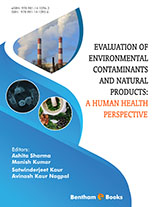Abstract
Cancer is characterized by cell proliferation, prevention or bypass of programmed cell death, genomic instability, angiogenesis, invasion and metastasis which are influenced by environmental pollutants. It is the major cause of death in world wide. Lifestyle factors such as diet, smoking and use of alcohol are responsible for the development of cancer in a large part of the population of developed countries. Existence of carcinogens or co-carcinogens in polluted air and drinking water, as well as in food, played a significant contribution in our country. Endocrine disrupters modify the risk of breast, endometrial and prostate cancer. Laryngeal, oropharyngeal, hypopharyngeal, sinonasal, nasopharyngeal, oral and lung cancer are positively associated with smoking and air pollutants. Tobacco smoking induces DNA adducts formation which is responsible for mutations at K-RAS and TP53 gene in the lung and pancreatic adenocarcinomas. Tobacco smoking induces promoter hypermethylation of p16 and DAPK genes in Non-Small Cell Lung Cancer (NSCLCs). Aflatoxin B1 (AFB1) causes promoter hypermethylation of tumour-suppressor genes RASSF1, MGMT, and p16 in human hepatocellular carcinoma (HCC) patients. Down-regulation of p15, p16, PRKG1, PARD3, and EPHA8 genes at mRNA level due to hypermethylation and increased expression of STAT3, IFNGR1 at mRNA level due to hypomethylation were reported in patients having benzene exposure. Methylationinduced transcriptional inactivation of tumor suppressor genes, including p53, CDKN2A (p16INK4A), Ras association domain family member 1 (RASSF1A), and death-associated protein kinase (DAPK) were reported in arsenic exposed individuals. The genetic and epigenetic alterations respond to environmental carcinogens have significant contribution for biomarker development in assessment of health risk.
Keywords: Arsenic Contamination, Asbestos, Benezene, Biomarkers, Bisphenol A, Cadmium, Cancer, DNA Methylation, Dioxins, Endocrine Disruptors, Gene Mutations, Inflammation, miRNA Alterations, Pesticides, PAHs, Tobacco, Tumor Microenvironment, Tumorigenesis.






















